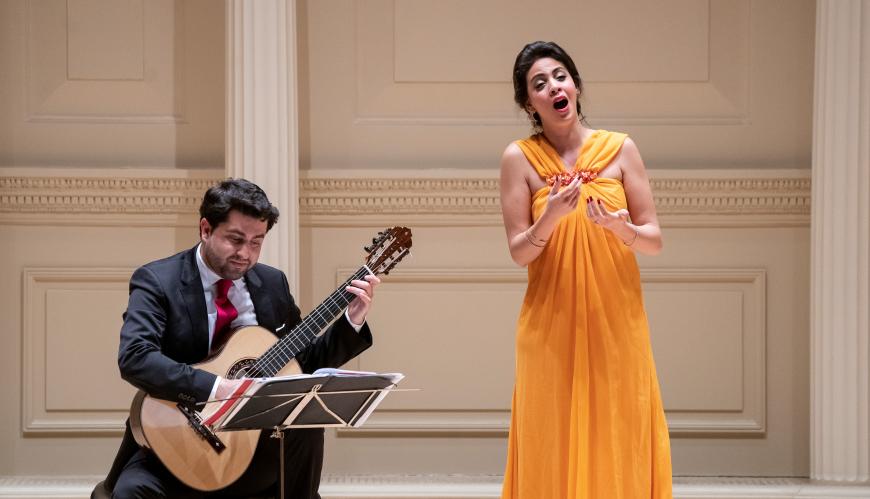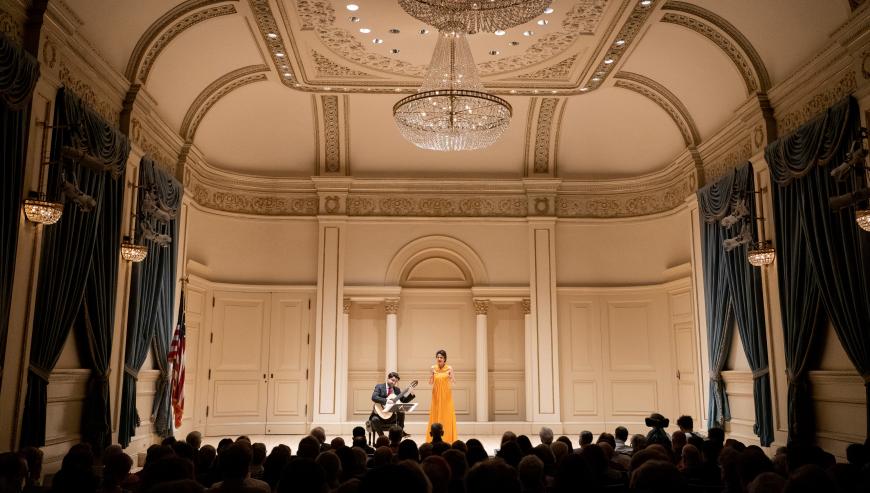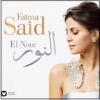
Every two years, the Rubin Institute for Music Criticism convenes in San Francisco, teaching music students across the U.S. about music journalism. SF Classical Voice has partnered with the Rubin Institute to give the program’s top writers more experience in the field with an internship. This year’s Rubin winners, Emery Kerekes and Lev Mamuya, will be with SFCV for six months, reporting from New York and Boston, respectively.
At the April 4 recital which marked her Carnegie Hall debut, soprano Fatma Said didn’t address the audience until her program was nearly finished.
“I come from Egypt. Rafael comes from Andalusia,” she said, gesturing toward guitarist Rafael Aguirre, her musical partner for the evening in Carnegie’s ritzy Weill Recital Hall. “But I feel like we’re coming from the same world.” For Said, Andalusia’s rich early (and ongoing) influences from Islam and Judaism — architectural, cultural, even gastronomic — resonate deeply. “When I visit Andalusia, I don’t feel like a stranger. I feel at home.”
It’s that cultural kinship which Said and Aguirre highlighted in their program, largely drawn from the former’s hit first album El Nour (released in late 2020 on Warner Classics — Aguirre appeared on several tracks).
The bulk of the pair’s selections came from Spain’s canon of folk songs, revised and rearranged by the nation’s 20th-century greats: Fernando Obradors, Federico García Lorca, Joaquín Rodrigo, and most prominently, Manuel de Falla. Other traditions of 1900s Spain appeared in the form of a single aria from a zarzuela, the national genre of folk operetta, and a set of Sephardic song settings, in a nod to Andalusia’s Judaic history. Levantine works both popular and classical appeared alongside the Iberian majority, allowing Said to shine in her native Arabic.
An impeccable sense for vibrato lent shimmer to Said’s broad range of vocal timbres. At times, her technique enriched the creamy splendor in her operatic mode. At others, it heightened the drama of her chesty lower register, an enrapturing evocation of the Romani singers associated with Spanish flamenco. And, in carefully meted moderation, Said used that choice vibrato to develop glints of intensity in her stunning, straight-toned pianissimo. Time stood still when she spun those breathy whispers, her tone blossoming ever so gradually over fermatas sustained to near-superhuman length.
Where Said’s Spanish flairs sometimes lost their sense of gesture, the smears and ornaments that adorned her Middle Eastern pieces fit in without interrupting her cool, syrupy singsong. “Aatini al naya wa ghanni” (“Give me a flute and sing”), written by Lebanese singer-songwriter Najib Hankash and popularized by the iconic singer Fairuz, struck poignantly in an undoctored duo version. (On El Nour, Said sets the gorgeous melody against a quintet of classical and traditional Arabic instruments.) The spare number stood in contrast to a jaunty art song by Gamal Abdel-Rahim, which portrays a sultan’s daughter reveling in her high status.

Said’s voice proved the perfect complement to the tender sound of Aguirre’s guitar. While the instrumentalist was occasionally dwarfed by the hall, the soprano never drowned the well-voiced chords that accompanied her. The duo ambled through a poignant valse-triste number by Egyptian composer Sherif Mohie El Din; stretched and compressed in step on the oompahs of an aria from José Serrano’s La canción del olvidó (The song of the forgotten, the aforementioned zarzuela); and slid easily through crunchy chords in octogenarian modernist Lorenzo Palomo’s Sephardic songs, their Spanish folk frames filled out with spiky blue notes.
Aguirre received a brief solo moment with a compelling account of classical guitar forefather Francisco Tárrega’s Gran Jota, a virtuosic set of variations on a bass line that consists only of tonic and dominant. One moment, he plucked a dreamy, gauzy sound with the flesh of his fingers, rather than the nails — no one takes manicures more seriously than classical guitarists. The next, he repurposed his guitar as a percussion instrument, tapping the body with his thumb as soft chords resonated faintly.
When Said retook the stage for her encore, she made a controversial proclamation: Encores, she believes, should be immediately recognizable. The rendition of “Over the Rainbow” which followed may have channeled Julie Andrews more than Judy Garland, but it was a kind, warm “go-in-peace” to cap a delightful evening.


